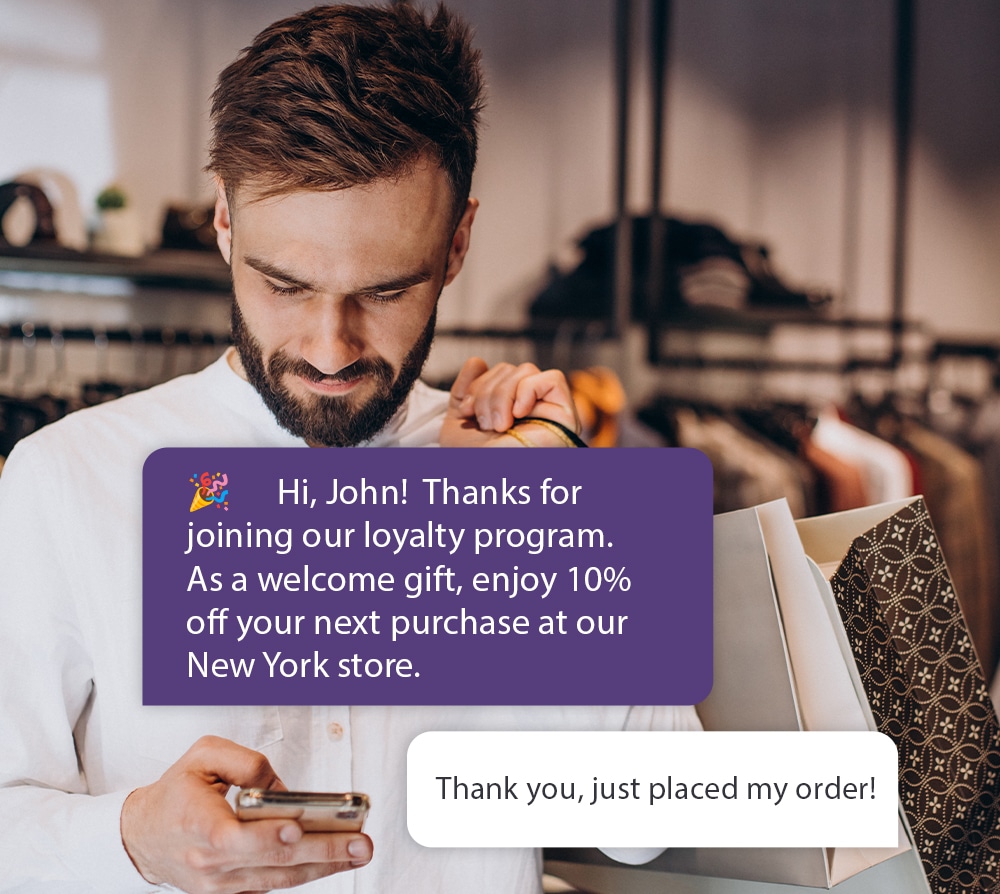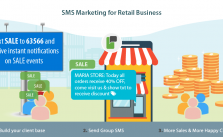Table of Contents
In the digital age, reaching customers has never been easier, yet keeping them engaged for the long haul is more challenging than ever. Many businesses use email marketing, social media, and online ads to connect with their audiences. However, one of the most powerful, often overlooked tools for building long-term customer relationships is SMS marketing.

What began as a simple method to send alerts and notifications has evolved into a sophisticated marketing strategy. With open rates that outshine email (around 98%) and the personal nature of direct messaging, SMS provides businesses with a golden opportunity to grab attention and nurture deep, lasting connections.
SMS marketing offers businesses a chance to engage customers where they spend much of their time—on their phones. More than just a transactional tool, SMS has become a channel where businesses can foster loyalty, increase customer lifetime value, and ultimately build long-term relationships.
In this guide, we’ll explain how SMS marketing transitions from a basic notification tool into a highly effective strategy for customer engagement. We’ll also explore how businesses can leverage immediate communication, personalized messaging, consistent engagement, and customer-centric approaches to create a foundation of trust and loyalty.
1. Immediate Communication
It can be hard to stand out when consumers are bombarded by emails, social media ads, and online notifications. SMS marketing cuts through this noise because of its unique immediacy and directness.
Imagine a customer shopping in a store who receives a text about an exclusive in-store offer that is only available for the next hour. This kind of real-time communication can instantly drive action, creating a sense of urgency that leads to quicker conversions than many other channels.
The Role of Speed in Customer Engagement
SMS marketing thrives on speed, allowing businesses to reach customers in real time. Here’s why immediacy matters:
- Timely updates and reminders: Whether it’s a sale that’s about to start or a reminder about an upcoming appointment, SMS ensures that customers receive important information when they need it, not after the fact.
- Effective in time-sensitive situations: Flash sales, last-minute deals, or unexpected changes (like a delayed delivery) can be communicated instantly, giving customers the information they need to act quickly.
- Real-time interactions foster responsiveness: Most SMS messages are read within three minutes, meaning businesses can generate near-instant customer responses. This creates a dynamic loop of communication where companies and customers stay in touch throughout the customer journey.
For example, food delivery apps use SMS to notify customers when their order is on its way or when it has arrived, keeping customers informed and engaged. Airlines do the same, sending gate changes and flight updates. In these cases, immediacy is key to delivering an excellent customer experience.
When businesses establish themselves as reliable sources of timely information, they build trust. Customers know they can count on the brand to keep them informed and deliver on promises.
How Immediate Communication Builds Trust:
- Instant solutions to customer needs: Customers value timely responses, whether it’s a shipping update or an urgent promotion. They’re more likely to stay engaged with a brand consistently delivering relevant information on time.
- Reduces uncertainty: Customers appreciate being kept in the loop. An SMS update on a delayed delivery reassures them that the business proactively addresses issues.
- Quick problem-solving: If a problem arises, businesses can notify customers instantly, preventing frustration. Being the first to communicate an issue and offer a solution shows responsibility and transparency.
2. Personalized Messages
Personalization is the hallmark of modern marketing, and SMS offers one of the most direct ways to personalize customer interactions. Unlike social media or email campaigns, which often broadcast the same message to a large audience, SMS allows for a more intimate and tailored communication style.
Customers don’t want to feel like one of the masses—they crave individual attention. SMS marketing enables businesses to send personalized content, including:
- Name-specific greetings: Starting an SMS with “Hi [Customer Name]” creates an instant personal connection.
- Custom product recommendations: Businesses can recommend products that match customers’ interests based on browsing history or previous purchases.
- Tailored offers and promotions: Sending unique discounts based on a customer’s previous purchase history increases the likelihood that they’ll act on the message.

The Power of Personalization in Customer Retention
Personalized SMS messages have a much higher engagement rate than generic ones. Why? Because customers feel recognized and valued. Here’s how personalization helps build long-term relationships:
- Emotional connection: Personalized messages speak directly to the customer, creating an emotional bond that makes them more likely to engage with the brand.
- Increased response rates: When customers feel a message was crafted specifically for them, they are more likely to take action, such as clicking a link or redeeming an offer.
- Higher conversion rates: Tailoring promotions to individual interests or purchase patterns significantly boosts conversion rates, directly impacting customer lifetime value.
For example, an online clothing store might send an SMS saying, “Hey Sarah, we know you loved our summer dresses! Here’s 15% off your next purchase of any new arrivals.” This personalized messaging prompts immediate action and fosters long-term loyalty by showing that the brand understands the customer’s preferences.
Tools for Personalizing SMS Marketing:
- Customer segmentation: Break down your customer base by behavior, preferences, location, or buying patterns to create more targeted campaigns.
- Automated triggers: Use computerized messages triggered by customer actions, such as abandoned cart reminders or product recommendations based on previous purchases.
- Behavioral data: Collect and analyze customer data, such as browsing behavior or purchase history, to send more relevant and personalized messages.
By personalizing the experience, businesses can build more meaningful relationships beyond the transactional level, creating a connection that encourages repeat business and long-term loyalty.
3. Consistent Engagement
The key to building long-term customer relationships is consistent engagement. It’s not enough to send an occasional SMS when you have a sale or promotion. Successful SMS marketing is about maintaining a regular, meaningful conversation with your customers.
Why Consistent Engagement is Important:
- Keeps customers engaged: Frequent, relevant messaging keeps your brand at the forefront of your customer’s minds. Regular communication keeps the relationship alive, whether it’s a weekly discount, a monthly update, or a holiday greeting.
- Creates a reliable touchpoint: Consistent communication reassures customers that your brand is dependable. When they know they’ll regularly hear from you with valuable information, they’re more likely to stay engaged and loyal.
- Boosts customer retention: Regular contact helps build familiarity, and familiarity often leads to trust. Brands that consistently engage their customers are more likely to retain them long-term.
However, it’s crucial to strike the right balance. You don’t want to overwhelm your customers with too many messages, or they’ll tune out or unsubscribe. Instead, focus on quality over quantity. Every message should provide value, whether a helpful reminder, a special offer, or relevant news.
Types of Consistent SMS Messages:
- Weekly deals or promotions: Send weekly discounts or exclusive offers to excite your customers about your products or services.
- Monthly newsletters: Use SMS to send short, punchy updates about new products, services, or company news.
- Seasonal or holiday greetings: To maintain engagement, send well-timed messages during key seasons or holidays. A simple “Happy New Year! Here’s a gift from us to start your year right” can go a long way.
For example, a beauty brand could send an SMS saying, “Hey [Name], don’t forget—your favorite skincare line is only 20% off this week! Shop now.” This message keeps the customer engaged while reminding them of the brand’s value.

The Benefits of Consistency in SMS Marketing:
- Creates anticipation: When customers know they’ll regularly receive offers or updates from you, they’ll start looking forward to your messages.
- Builds a habit: Consistent messaging becomes part of the customer’s routine over time. They become accustomed to hearing from your brand and engaging with it.
- Strengthens brand recall: The more frequently a customer interacts with your brand, the more likely they will remember it when making a purchase decision.
- Enhances trust: Consistently receiving messages builds a sense of reliability, increasing customers’ trust in your brand and offerings.
- Improves engagement rates: Regular messaging helps maintain active communication with customers, leading to higher open and click-through rates, as they are familiar with your brand’s value.
- Promotes long-term loyalty: By providing valuable and consistent content, you create deeper relationships with your customers, encouraging long-term loyalty and repeat purchases.
- Supports marketing campaigns: Consistent messaging aligns with other marketing efforts, creating a cohesive strategy across channels, reinforcing your brand’s messaging.
4. Customer-Centric Approach
In the modern marketing landscape, customers value control. They want to decide how and when they receive communications. SMS marketing allows businesses to adopt a customer-centric approach by offering customers the flexibility to opt in, opt-out, and adjust their communication preferences.
By respecting your audience’s preferences, you strengthen your brand’s and customer’s bond and trust. This level of respect and consideration is essential for fostering long-term relationships.
How to Implement a Customer-Centric SMS Marketing Strategy:
- Opt-in and Opt-out Options: Always provide a clear way for customers to opt in and opt out of receiving SMS messages. This ensures that only those who genuinely want to hear from your brand remain on your list, which improves engagement rates.
- Frequency control: Allow customers to choose how often they receive your messages. Some might want to hear from you weekly, while others prefer monthly updates.
- Content preferences: Provide options for customers to select what kind of content they want to receive. For example, some might only be interested in promotions, while others might appreciate updates on new products or services.
Benefits of a Customer-Centric Approach:
- Increases trust: When customers feel they’re in control of the conversation, they are more likely to trust your brand. They appreciate being able to adjust their preferences rather than feeling bombarded by unwanted messages.
- Reduces churn: Customers who can tailor their communication preferences to match their needs are less likely to unsubscribe, which reduces churn and increases long-term engagement.
- Enhances personalization: Allowing customers to select their preferences also enhances the personalization of your messaging, making it more relevant and appealing.
A customer-centric SMS marketing strategy ensures that your audience feels valued and heard. By giving them control over how they interact with your brand, you build a foundation of trust and loyalty that will serve you well in the long term.
5. Building Trust and Loyalty
At the heart of every successful customer relationship is trust. Trust is built over time through consistent, thoughtful communication that adds value to the customer’s life. SMS marketing can play a pivotal role in establishing and nurturing that trust.
When customers trust your brand, they are more likely to stay loyal. SMS marketing allows businesses to provide real value—whether through exclusive offers, early access to sales, or timely updates—reinforcing that trust and encouraging customers to stick around for the long haul.
How SMS Marketing Builds Loyalty:
- Exclusive offers: Customers love feeling like they’re part of something special. Offering exclusive deals and discounts via SMS can make customers feel valued and appreciated. This creates a sense of loyalty and makes them more likely to engage with your brand.
- VIP treatment: Use SMS marketing to give your most loyal customers early access to sales, limited-time offers, or special events. Treating your top customers like VIPs increases their loyalty and makes them feel like a priority.
- Transparency and honesty: SMS marketing can also be used to communicate transparently with customers. Keeping customers informed in real time builds trust, whether it’s an update on their order or a quick message to apologize for an error.
For example, an eCommerce store could send a message like, “Hi [Name], thank you for being a loyal customer! As a thank you, here’s early access to our Black Friday sale—just for you.”
When customers feel valued and appreciated, they are more likely to stay loyal to your brand. SMS marketing provides the perfect opportunity to communicate that appreciation in real time, fostering long-term relationships that drive business growth.
Building Long-Term Customer Relationships
Ultimately, SMS marketing is about creating a continuous dialogue with your customers. You can build strong, long-lasting relationships rooted in trust and loyalty by keeping them engaged, offering personalized experiences, and respecting their preferences.
When used effectively, SMS marketing becomes more than just a tool for sending alerts and notifications—it becomes a powerful strategy for customer retention and long-term success.
6. Community Building
While SMS marketing is often seen as a direct one-on-one communication tool, it can also be an effective community-building strategy. Brands can use SMS to cultivate a sense of belonging among their customers, making them feel part of an exclusive group. This is especially powerful for fostering long-term relationships, as it taps into the human desire for connection.
How SMS Marketing Builds Community:
- Exclusive memberships and clubs: Offering customers the chance to join an SMS-only group with special perks, such as early access to products, members-only sales, or even behind-the-scenes content, fosters a sense of exclusivity and loyalty.
- Encouraging user-generated content: SMS can engage customers by asking for their feedback or testimonials or encouraging them to share their experiences with your brand on social media. A simple text like “Send us your review for a chance to be featured!” can make customers feel part of a bigger community.
- Localized content and events: For brands with physical locations, SMS can also inform customers about local events, pop-up shops, or meet-and-greet opportunities. Sending location-specific messages builds a sense of local community, bringing customers together in real life and online.
Examples of Community-Building Through SMS:
- Sneak peeks and early access: Brands like fashion retailers or tech companies can offer SMS subscribers a sneak peek of new collections or product launches before the general public, reinforcing their special connection with the brand.
- Customer polls and engagement: Invite your SMS community to participate in quick polls or surveys about future products or events. This makes customers feel like their opinions matter, strengthening their connection with the brand.
By using SMS as a tool for community building, you can turn passive customers into active participants who feel a deeper connection to your brand. This kind of loyalty is hard to replicate through other channels, making SMS a unique and powerful way to foster a sense of belonging among your customers.

7. Data-Driven Improvements
One of the major advantages of SMS marketing is the wealth of data it can provide. From open rates to click-throughs and conversion metrics, SMS analytics give businesses valuable insights into customer behavior and campaign performance. Companies can continuously refine their SMS marketing strategies by analyzing this data to optimize engagement and results.
How Data-Driven Insights Enhance SMS Marketing:
- Monitoring engagement: Track which messages get the most engagement, including open rates, link clicks, and replies. This allows you to understand what resonates with your audience and adjust future campaigns accordingly.
- A/B testing: Experiment with different message formats, tones, and offers to see which approach works best. For example, test a short, concise offer against a longer, more detailed message to determine which drives higher conversions.
- Personalization improvements: Use customer behavior data, such as which links they clicked or which products they purchased, to further refine your personalization efforts. Over time, this enables you to send more tailored messages that better meet each customer’s needs and preferences.
Examples of Data-Driven SMS Marketing:
- Timing optimization: By analyzing when customers are most likely to open and engage with your texts, you can send messages at the optimal time of day for maximum impact. If most of your audience engages with your messages in the evening, adjust your schedule accordingly.
- Campaign refinement: After running a promotional SMS campaign, analyze the data to determine its success. Did a particular type of discount work better than others? Were customers more engaged with product launches or seasonal promotions? This feedback loop allows for continuous improvement.
The Value of Data-Driven Refinement:
- Better targeting: Data allows you to segment your audience more effectively, ensuring that the right messages reach customers. By identifying the top-engaging segments, you can focus more on high-value customers.
- Improved ROI: By understanding what works and what doesn’t, you can allocate your resources more efficiently, maximizing the return on your SMS marketing investment.
- Increased customer satisfaction: The more personalized and relevant your messages become, the more satisfied your customers will be. This data-driven approach ensures that your SMS communications always improve and provide value to your audience.
Using SMS analytics to make informed decisions about your marketing strategy helps ensure that your campaigns are effective and constantly evolving to meet customer expectations. Over time, this results in more engaging, relevant messaging that enhances customer satisfaction and loyalty.
8. Customer Feedback Loops
One often-overlooked benefit of SMS marketing is its ability to act as a customer feedback tool. SMS provides an excellent platform for gathering customer insights and ensuring your brand remains aligned with your audience’s needs and expectations. Customers are more likely to respond to a short, simple SMS than an email survey, making it an ideal channel for collecting real-time feedback.
How SMS Facilitates Customer Feedback:
- Quick surveys and polls: You can send short, simple surveys via SMS to get direct insights into customer satisfaction, product preferences, or service feedback. For example, after a purchase or service interaction, you can ask customers to rate their experience on a scale of 1 to 5.
- Product feedback: Ask your customers about new product ideas or their thoughts on recent purchases. For instance, an SMS could say, “How do you like your new purchase? Reply with ‘yes’ or ‘no’ to help us improve.”
- Incentivized feedback: Encourage customers to provide feedback by offering them a small incentive, such as a discount code or entry into a prize draw, which will drive higher response rates.
The Value of Collecting Customer Feedback via SMS:
- Real-time insights: SMS allows you to gather instant feedback on products, services, or even recent experiences, providing you with actionable insights that can be used to make immediate improvements.
- High response rates: Because SMS feels more personal and urgent than other forms of communication, customers are more likely to respond quickly and consistently.
- Improved customer relationships: Customers feel a stronger connection to your brand when their feedback is requested and valued. Responding to their suggestions or concerns demonstrates that you’re committed to improving their experience.

Examples of Feedback in Action:
A restaurant could send a follow-up SMS after a meal asking, “How was your experience with us today? Reply with a number from 1 to 5, where 1 is poor, and 5 is excellent.” Similarly, a clothing retailer could ask customers for a quick product review, helping them gather useful feedback on new arrivals.
By regularly gathering feedback through SMS, businesses can monitor customer satisfaction, adjust their offerings based on real-world insights, and improve their overall customer experience. This continual feedback loop and improvement leads to stronger customer relationships over time.
9. Integrating SMS with Omnichannel Marketing
While SMS marketing is a powerful tool, it becomes even more effective when integrated into a broader omnichannel marketing strategy. Customers today interact with brands across multiple touchpoints—email, social media, in-store, and online—so ensuring a seamless experience across all these channels is essential for building long-term relationships.
How SMS Fits into an Omnichannel Strategy:
- Coordinating with email marketing: SMS can complement email campaigns by sending shorter, more urgent updates or reminders. For instance, if an email newsletter announces a big sale, a follow-up SMS can remind customers when the sale is about to end, driving last-minute engagement.
- Connecting with social media: Use SMS to direct customers to your social media platforms for special offers, contests, or user-generated content initiatives. For example, you could send an SMS saying, “Check out our Instagram for a sneak peek at our new collection!”
- Supporting in-store experiences: Retailers with physical locations can use SMS to enhance the in-store experience by offering location-specific promotions, curbside pickup notifications, or personalized offers when customers enter the store.
Benefits of Omnichannel Integration:
- Consistent messaging: When SMS is integrated with other marketing channels, your brand message becomes consistent across platforms. This creates a cohesive customer experience that reinforces brand identity and strengthens customer trust.
- Increased touchpoints: SMS adds another layer of communication that keeps customers engaged throughout their journey. Whether they’re browsing online, shopping in-store, or interacting on social media, SMS ensures that your brand stays connected with them.
- Better customer tracking: By integrating SMS with other digital marketing tools, you can track a customer’s journey across multiple channels and tailor future communications based on their behavior. This creates a more personalized and streamlined customer experience.
Examples of Omnichannel SMS Marketing:
An e-commerce store could send an email announcing a flash sale and follow up with an SMS reminder about when the sale is about to end. A fitness brand might use SMS to remind customers of a workout challenge also being promoted on social media, creating a seamless experience across platforms.
By integrating SMS with your broader marketing strategy, you can create a unified, omnichannel experience that keeps customers engaged no matter where they interact with your brand. This ensures you stay relevant across all touchpoints, building trust and fostering long-term relationships.

Final Thoughts
SMS marketing is no longer just about sending simple alerts or transactional messages. It’s about building meaningful, personalized, timely interactions that create lasting customer relationships. Businesses can use SMS to go beyond notifications and develop deep, long-term connections with their audience by focusing on immediacy, personalization, consistent engagement, and a customer-centric approach.
Brands that recognize the power of SMS marketing for relationship building will not only drive short-term sales but also cultivate customer loyalty, ensuring sustained growth and success in the long term. As the world becomes increasingly digital, SMS marketing provides a personal, direct line of communication that fosters trust, engagement, and loyalty.
By transforming your SMS strategy from transactional to relational, you’ll enhance customer satisfaction and build a loyal customer base that will continue to engage with your brand for years.






